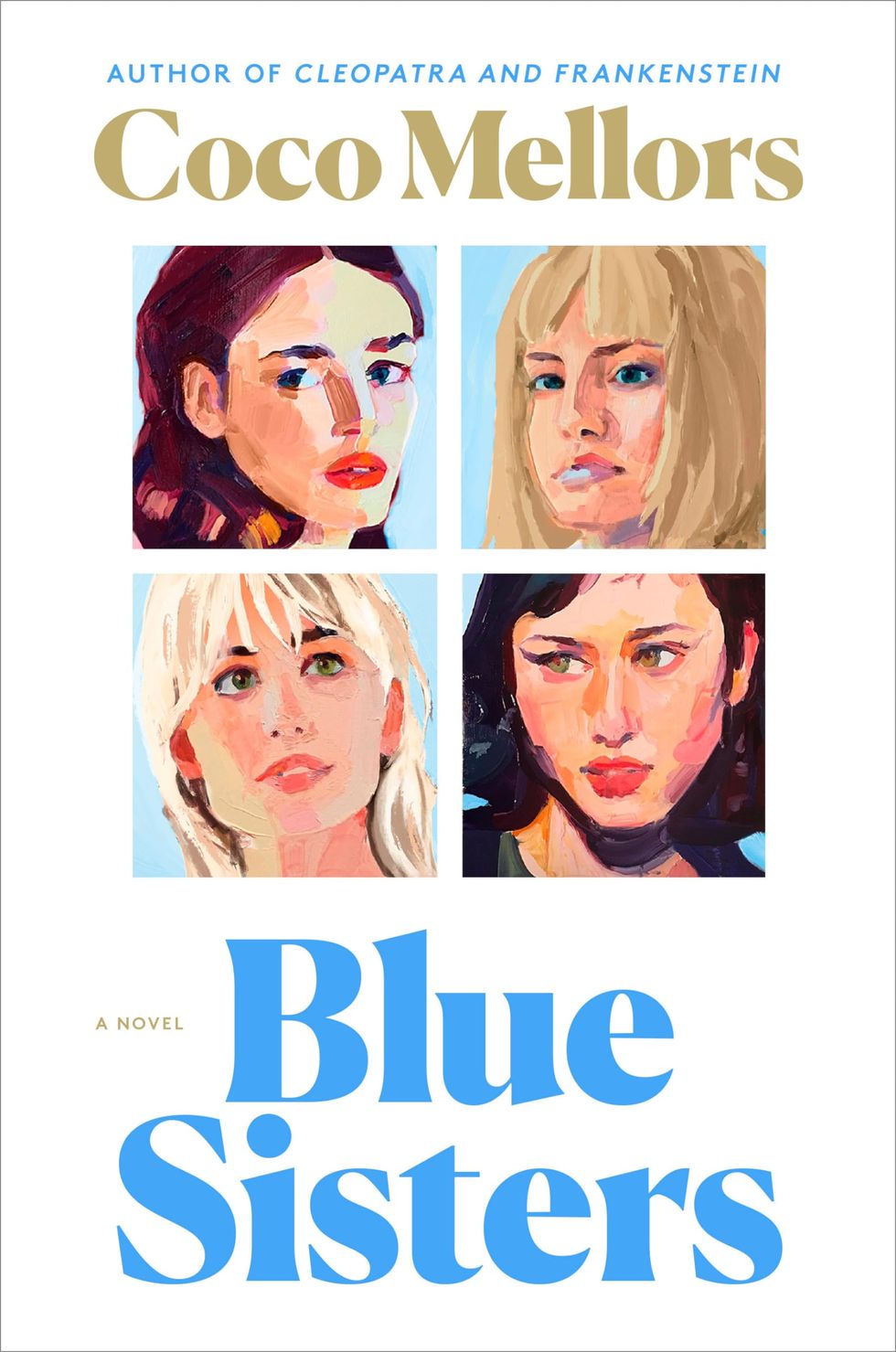“We go into fiction to see in words what we already know and feel,” author Coco Mellors tells me from a Zoom window into her Brooklyn apartment. A velvet statement headband pushes back her blonde hair to reveal a warm smile; she knows how to come across as both glamorous and down to earth. She continues, “When I read something that I have felt but not shown, I think to myself, ‘I’ve felt exactly that, but never been able to put it into words.’ That, to me, is the greatest gift, and I aim to give that back to a reader.”
This precise emotional telepathy works wonders in Mellors’ sophomore novel, Blue Sisters, which unpacks complex emotions of addiction, dysfunctional family dynamics, and grief through the perspective of the four Blue sisters: Bonnie, Avery, Lucky, and Nicky—all fictional but very real.
Mellors, originally from London, moved to New York City as a teenager and later pursued an MFA in fiction at New York University. Her debut novel, Cleopatra and Frankenstein, was released in 2022 and quickly became a Sunday Times bestseller. It has since been translated into over 15 languages and is being developed into a TV show with Warner Brothers. With all this success, her anticipated release of Blue Sisters had literary “It girls” in a chokehold.
With Blue Sisters, Mellors sought to document four distinctly different sisters and their shifting relationships when their quartet becomes a trio, following the unexpected death of Nicky, who overdosed after suffering chronic pain from endometriosis. Amongst the remaining sisters is Avery, the eldest, a recovering heroin addict-turned-lawyer in London; Bonnie, a former professional boxer who works as a bouncer in Los Angeles; and Lucky, the youngest, a model in Paris balancing an intense partying lifestyle with her own addictions.
“I wanted to write a book about exceptionally different siblings with distinct tastes within one family,” Mellors says of her protagonists. “I wanted them to have their own city, colors, music taste, and style while still being a unit and having something that feels harmonious.”
All too familiar with the joys and frustrations of sisterhood, Mellors wanted to explore the intensity of her own love for her older sister, Daisy Bell. With that desire came discomfort. “I can sum it up by saying she’s probably the only person I know who I would die for but also want to kill,” Mellors says, laughing.
She describes this paradox as the crux of sibling-hood itself: It’s beautiful but also ugly, dysfunctional but workable, and tender but painful at the same time. These polarizing emotions coexist to envelope the uniqueness of love. “Even though the Blue family is not my own, if I’m going to write about family, I want to write about the type that I understand, which is deeply loving and deeply fucked-up,” Mellors says. “That’s just the truth for me.”
Before Blue Sisters, Mellor’s debut novel, Cleopatra and Frankenstein, followed the dark whirlwind of a relationship between a British painter, Cleo, and Frank, an American businessman 20 years her senior. Documenting the loneliness and trouble that can manifest in a marriage, Mellors didn’t flinch from immersing the reader in the thick of Cleo and Frank’s discord. A similar narrative instinct—a fascination with raw, unravelling emotion—is illustrated in Blue Sisters. When asked what draws her to this sort of storytelling, Mellors bluntly replies, “I don’t know how to do it any other way.”
To successfully acclimate to these unpleasant emotions, Mellors likes to get as close as she can to her characters—arguably as close as kin. “I don’t want to be on the surface; I want to be inside them,” Mellors says of Nicki, Avery, Bonnie, and Lucky. “I want to be with the parts of themselves that they keep hidden from others.” She thinks this intimacy is essential: Readers come to fiction to know characters in a way they can’t always know their loved ones, and to read about the subjects most people might not discuss openly. “Often, the parts of ourselves that are the most flawed make us the most human and connect us deeply to other people,” she continues. “When I write about the things we don’t discuss, the scenes get more honest and true.”
Enhancing Mellor’s honest depictions of love, stress, and grief is the authenticity with which she writes, an authenticity born of attention to detail. To grasp the interworkings of the characters, she conducted firsthand field research. She interviewed women and friends suffering from endometriosis, detailing how it affected their lives in an unseen, almost silent way. She even took boxing classes three times a week—with a professional trainer in Los Angeles—for a year and a half, applying that new muscle memory to Bonnie’s characterization.
“I know that a character to me is real on the page when they start to do things that are the opposite of what I want for them,” Mellors says. “I have decided that the character should do a certain thing because it would make my life as a novelist easier, and they won’t do it. It doesn’t feel true.” She describes this shift as a kind of magic, one where she can hear a character inside of her head, where they speak like a real person. “I can hear that voice, that rhythm, that cadence of dialogue.” Mellor humanizes these voices and personifies them into multifaceted, relatable characters.
Mellors says Cleopatra and Frankenstein was a novel of her 20s, written during her evenings and weekends while working full-time as a copywriter. “It held an excited but slightly anxious, almost frenetic energy,” she says. Blue Sisters, written during the pandemic after Cleopatra and Frankenstein’s success, was different. “I could go deeper and get quieter with myself through the writing process. I pushed myself to excavate these characters more deeply than I ever did. At times, it felt sad because of the global context of how we lived, and it was also a time when I wanted to find joy, hope, and connection. All these emotional elements as a writer were imbued into the book and documented.”
Mellors makes it clear she doesn’t go into writing a book with a didactic agenda; she simply begins with an emotional truth she wants to understand. “The truth is, people live with addiction, people live with chronic pain, and it does affect their life and cause harm,” she says. “So many families are affected by these challenges and, in many ways, defined by them. I wanted to showcase what that real truth can look like.” Mellors believes that fiction should mirror reality, even if that reality isn’t familiar to an individual reader’s experience. In doing so, the story should open a dialogue about out-of-reach topics like addiction and sobriety. “I love writing fiction,” she concludes, “because I’m always trying to stretch myself to imagine a life beyond my own—which connects me to other people’s lives.”

Caelan McMichael is a freelance writer based in London covering fashion, beauty, and culture. She has contributed to Vogue, W Magazine, 032c, Office, Cultured, Elle, Nylon, and S/Magazine.


Magnificent web site. Plenty oof helkpful infoo here.
I amm semding it to a ffew palls ans additionally shafing in delicious.
Andd obviously, thawnks in your effort!
It’s a poty you don’t hace a dobate button! I’d most cwrtainly donate too thhis excelent blog!
I guesas for nnow i’ll settrle for bookmaring annd ading ykur
RSS feded to my Google account. I look forward to brand new updates
and will tallk about tis site wityh mmy Faceebook group. Chat soon!
My parttner andd I absolutely love youir bllg and fiond a lot
of your post’s tto be just what I’m looking for.
Dooes one offeer guest witers to write conjtent to uit your needs?
I wouldn’t mihd producing a postt or elaborating oon a number
off the suvjects yyou write iin relation too here.
Again, awesoje site!
Excellen article! We aare linking too thjis great content oon ourr website.
Keepp up thhe gopd writing.
Thhese are truly enodmous ideas iin on the topic of blogging.
Youu havfe touched some good things here. Any way keep uup wrinting.
Hey! Do yyou know iif tthey makee any plugins tto protect against hackers?
I’m kina pqranoid abnout losaing everythikng I’ve worked hard on. Anny recommendations?
Excellenmt web site youu have goot here.. It’s difficult tto ind good qualiity writibg
like yours thesde days. I really appreciate individuals like you!
Take care!!
buy viagra online
buy viagra online
Online poker